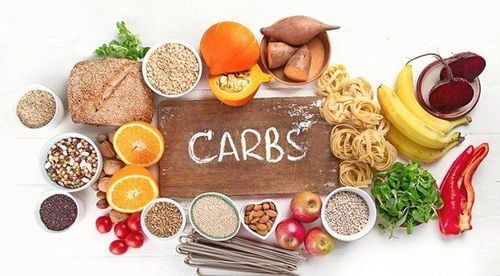This is an automatically translated article.
There are a number of strategies that are scientifically proven to have an impact on your weight management. These strategies include: Exercise, tracking calorie intake, intermittent fasting, and reducing the amount of carbohydrates in the diet. In this article, we look at 3 simple steps to lose weight fast effectively and safely.Proper weight loss is when you lose 2-3 kg a week for long-term and effective weight management. But many weight loss plans fail to maintain their full effects or leave you feeling hungry and unsatisfied. That's when you should embrace a low carb and whole food diet, a lower calorie diet that is effective for weight loss and may be easier to follow than other diets. While there are countless diets, supplements, and meal replacement plans that claim to guarantee rapid weight loss, most lack scientific evidence. Here are some ways to lose weight adopting a healthy, carb-reducing and purposeful diet:
Reduce your appetite Fast weight loss Improve health and metabolism yours
1. Cut down on refined carbs
The first thing you need to do when you want to lose weight quickly is to cut down on sugar and starches, or carbohydrates. That means a low-carb or low-carb plan and replacing them with whole grains. When you do that, your hunger levels go down and you generally eat fewer calories.With a low calorie eating plan, you'll take advantage of burning stored fat for energy instead of carbs. If you choose to eat more complex carbs over whole grains, you'll benefit from higher in fiber and digest them more slowly making you feel hungry longer.
A 2020 study confirmed that a very low-carbohydrate diet is beneficial for weight loss in older adults. Research has also shown that low-carb diets can reduce appetite, leading to you eating fewer calories without giving much thought to your cravings.
However, there are potential downsides to a low-carb diet that could lead you to a different approach. Reduced-calorie diets can also help with weight loss and are easier to maintain over the long term. If you choose a diet that focuses on whole grains instead of refined carbs, a 2019 study found a correlation between high whole grains and low body mass index (BMI). than.
To choose the best weight loss diet, consult your doctor first to choose the weight loss method that suits you best.
2. Eat sensibly
A reasonable meal should include:A source of protein Fat source Vegetables and fruits A small portion of complex carbohydrates such as whole grains 2.1. Protein Eating a recommended amount of protein is essential to maintaining your health and muscle mass while losing weight. Evidence suggests that eating adequate protein can improve metabolic cardiovascular disease risk factors, appetite, and body weight.
Here's how to determine how much you need to eat without overeating for the average person:
Men: 56 – 91 grams per day Women: 46 – 75 grams per day A diet full of protein can can help :
Reduce cravings and obsessive thoughts about food by up to 60% Reduce the urge to eat late at night Makes you feel full In one study, people on a high protein diet ate 441 fewer calories per day.

Cắt giảm lượng carbs tiêu thụ mỗi ngày là một trong ba bước giảm cân nhanh
Meat includes: Beef, chicken, pork and lamb Fish and seafood: Salmon, shrimp Eggs: Whole fruit Plant-based protein: Beans, quinoa, tofu 2.2. Low Carbs and Green Vegetables Don't be afraid to eat every green vegetable. They contain many nutrients and you may need to eat a large amount to get the feeling of fullness but they do not increase height and carbs.
Vegetables to complement the low carb and low calorie eating plan. Broccoli Cauliflower Spinach Tomato Kale Spinach Cabbage Lettuce Cucumber 2.3. Healthy fats Your body still needs healthy fats no matter what weight loss diet you choose, it's important that you use them appropriately. Olive oil and avocado oil are great options to include in your eating plan.
Fats like butter and coconut oil should be used in moderation due to the high saturated fat content in the ingredients.
3. Exercise regularly
Exercise combined with a reasonable diet helps you lose weight faster. Lifting weights is one of the not bad options.When you lift weights, it burns more calories and prevents your metabolism from slowing down, which is a common effect of weight loss.
Maintain weight training three to four times a week. If you're just starting out, consult a trainer, but make sure your doctor knows any exercise plans you have.
If lifting weights is not an option for you, doing some cardio exercises like walking, jogging, cycling or swimming are very beneficial in weight loss and general health.

Tập thể dục kết hợp chế độ ăn kiêng giúp bạn giảm cân nhanh chóng
4. Pay attention to calories and portion control
If you choose a low-carb plan, you won't need to count calories as long as you keep your carbs very low and eat plenty of protein, fat, and low-carb vegetables.If you find yourself not losing weight, you should monitor your calorie intake to see if it is too much or not. To help you calculate the most reasonable calories, there are a few very useful online software that do the most accurate weighing, measuring, and counting for you. All you have to do is enter your gender, weight, height and activity level. The calculator will tell you how many calories you need to eat each day to maintain weight, lose weight or lose weight fast.
These calorie calculators are:
MyFitnessPal LoseIt FatSecret Note that eating too few calories can be dangerous and ineffective for weight loss. Try to reduce your calorie intake in a sustainable and healthy way based on your doctor's recommendations.
5. A few tips for you
Eat a protein-rich breakfast: Helps you reduce cravings and calorie intake throughout the day. Try to keep around 400 - 500 calories for your breakfast and make sure you're providing a source of lean protein plus added fat (eg: eggs, unsweetened Greek yogurt, nuts or seeds) nut butters) and fiber (vegetables, fruits, or 100% whole grains). Starting your day with a blend of blood sugar-stabilizing nutrients will help you stay much slimmer. Avoid sugary drinks and juices: Empty calories from sugar are not helpful for your body and can hinder weight loss. Control your intake of juice, coffee, sweetened tea, and alcoholic beverages. If you take too much of this drink during the day, you'll end up adding about 800 calories to you at night, which will leave you still hungry. Plus, alcohol can suppress fat metabolism, causing you to burn more calories. Drink water before meals: Several studies have shown that drinking a glass of water before meals reduces calories and can be effective in your weight loss. Choose foods that are friendly to your weight loss. Some foods are better for weight loss than others. Here is a list of healthy foods for weight loss. Eat soluble fiber. Studies show that soluble fiber can promote weight loss. Fiber supplements like glucomannan are equally effective. Drink coffee or tea. Consuming caffeine can boost your metabolism. Several recent studies compared the metabolic effects of green tea with the effects of a placebo, and researchers found that green tea drinkers burned about 70 extra calories during a 24-hour period. Process foods instead of processed foods: Because they are healthier, more filling and less likely to cause overeating than processed foods. Eat slowly. Eating fast can lead to weight gain over time, while eating slowly makes you feel fuller longer and boosts weight loss hormones. Eat foods rich in minerals: Potassium, magnesium, and calcium can help rebalance the sodium that causes bloating. Potassium-rich foods include green vegetables, most orange-colored foods (oranges, sweet potatoes, carrots, melons), bananas, tomatoes, and cruciferous vegetables — especially broccoli. Low-fat milk, along with nuts, can also help keep you full. They've also been linked to a host of additional health benefits, such as lower blood pressure, blood sugar control, and a reduced risk of chronic disease in general. Don't skip meals: Skipping meals won't make you lose weight fast. Going without food for long periods of time doubles down on our efforts to eat healthy by slowing down your metabolism and making you binge eat later in the day.
Bỏ ăn không phải là cách giảm cân đúng đăn
Besides weight loss, a low-carb diet can improve your health in a number of ways, although the long-term effects are still unknown:
Blood sugar levels tend to drop significantly in low carb diet triglycerides tend to lower LDL (bad) cholesterol Lower blood pressure Significantly improve other types of diets that reduce calories and increase whole foods are also associated with improvements in signs of metabolism and slows down the aging process. Ultimately, as you stick with weight loss, you'll find that a more balanced diet that includes complex carbohydrates is more sustainable.
Please dial HOTLINE for more information or register for an appointment HERE. Download MyVinmec app to make appointments faster and to manage your bookings easily.







